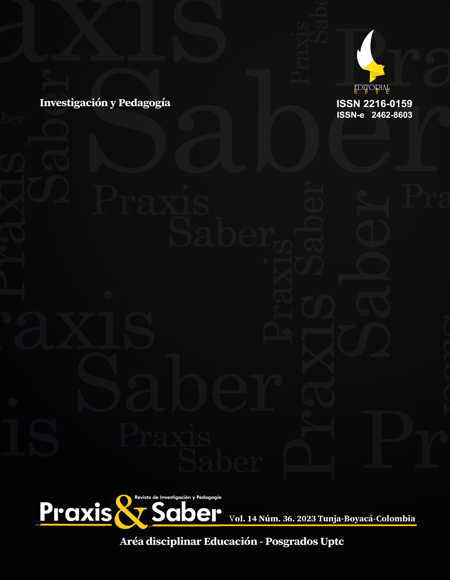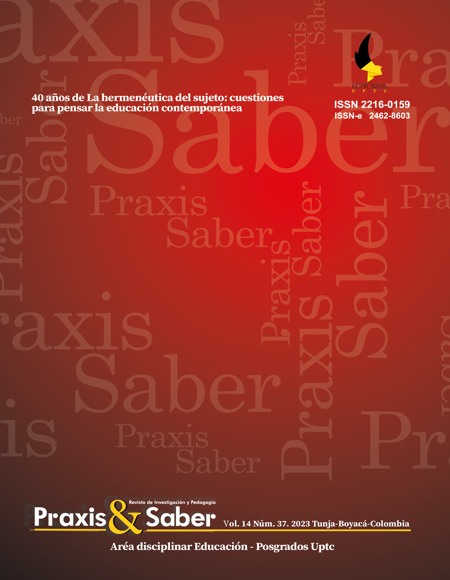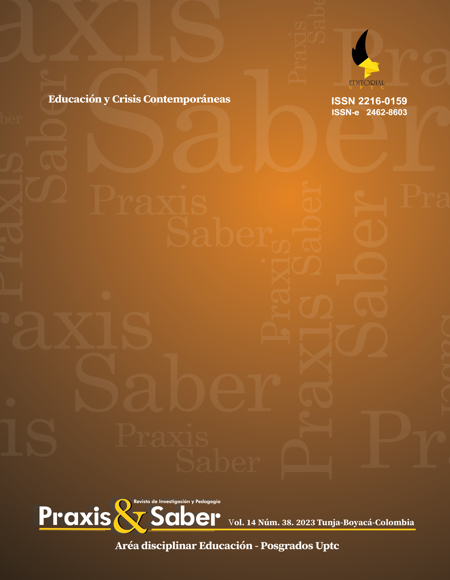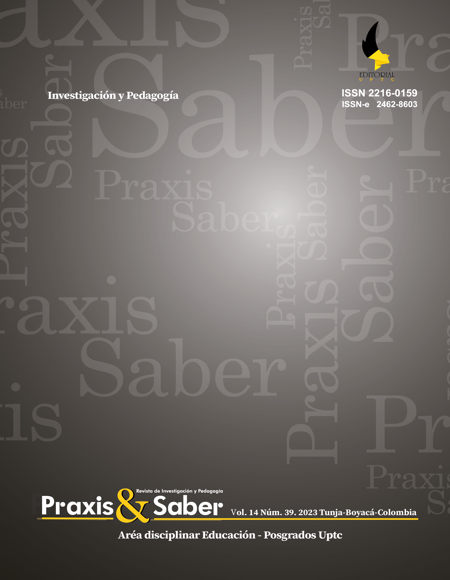About the Journal
Praxis & Saber ("Praxis & Knowledge") is a refereed scientific journal of continuous publication, which publishes four issues per year. It is interdisciplinary in nature and its purpose is to disseminate research articles that contribute to the consolidation of the educational and pedagogical field.
Praxis & Saber convenes high-level national and international researchers who focus on analyzing and understanding the complexity of contemporary educational realities.
The specific fields in which the journal publishes papers are education, pedagogy, and didactics.
The journal is in the national classification system Publindex (Minciencias B)
Regional Indexes: Scielo, Redalyc, Biblat, Scielo Analytics
Compressive Indexes: Emerging Sources Citation Index
Aggregators: LATINDEX (Catalog), EBSCO, Dialnet, REDIB, Clase, OEI - Digital Library, EuroPub.
Directories: Directory DOAJ, Ulrich's Periodical Directory, SHERPA/RoMEO, MIAR, LATINDEX (Directory)
DOI: https://dx.doi.org/10.19053/issn.2216-0159
ISSN: 2216-0159
E-ISSN: 2462-8603 (Online)
Focus / Scope
Praxis & Saber is a scientific journal of continuous publication, which publishes four issues a year, of an interdisciplinary nature, and its purpose is to disseminate research articles that contribute to the consolidation of the educational and pedagogical field. Praxis & Saber summons national and international researchers of high level, who work problems on the understanding and the action of contemporary educational realities. The specific fields in which the journal publishes works are education, pedagogy and didactics.
The journal offers two options for authors to participate:
- by means of monographic texts with specific topics and established call dates.
- in the research and pedagogy section, which welcomes articles focused on education,
pedagogy, and didactics in general. The receipt of these articles is open throughout the year.
The journal, due to its participative dynamics, invites national and international editors, who, from their theoretical fields of interest, support and coordinate the dossiers in each of the issues. The publication is funded by the Faculty of Education Sciences, through the Master´ s program in Education and the Research Division of the Pedagogical and Technological University of Colombia.
Praxis & Saber is available online through databases, repositories, and catalogues. The journal´ s
scope is national and international, as it reaches a specialized audience in the field of education and pedagogy: researchers, students (undergraduate and postgraduate), and teachers from different educational stages. It also offers open access on the internet, so that anyone interested in the topics can disseminate, consult, cite, and reference the journal.
Publication frequency
Praxis & Saber is a scientific journal published on an ongoing basis, with four issues a year.
Peer review process
The articles published in Praxis & Saber result from high quality scientific research. These are original and unpublished. Likewise, all articles submitted to the journal undergo the following assessment process:
- preliminary check (carried out by the editor-in-chief and the Editorial Board)
- peer review process (double-blind system; evaluation form).
- report (delivered by the Editorial Board).
Evaluation criteria and outcomes.
The process is carried out according to the criteria of originality, timeliness, contributions, scientific rigor, and compliance with the editorial standards of the journal. Assessed articles may have three outcomes: publishable, publishable with
comments, and unpublishable. When the article is classified as publishable with comments, it is notified to the author, who decides freely whether to take them into account, implement the changes, and proceed with the editorial process, or to withdraw. In this case, the author must
communicate their decision in writing to the journal´´ s Editorial Board. When the report is unpublishable, the author is notified. This decision is not subject to appeal.
When the peer reviewers disagree on the decision on an article (one considers it accepted and the other considers it unpublishable), the text is classified as unpublishable.
Duration of the peer review cycle.
The full peer review cycle of an article takes, on average, one quarter. This time may be longer or shorter, depending on the availability of peer reviewers and the specificity of the topic of each text.
Costs.
Praxis & Saber does not charge any fee for the receipt of articles, assessment, and publication in the journal. Therefore, it does not entitle authors, peer reviewers, or boards to any remuneration.
Legal Notice.
The submission of an article does not necessarily mean that it will be published. In other words, the Editorial Board reserves the right to decide on the publication of articles (in the event that an ethical or scientific quality problem is detected at any stage of the process).
Neither the editor-in-chief, nor the publisher, nor the Editorial Board of the journal Praxis & Saber assume any responsibility for the ideas and opinions expressed by the authors in their articles, since the latter have been approved through an independent process based on scientific criteria.
Languages.
Praxis & Saber publishes articles written in Spanish, English, and Portuguese. The translation of abstracts from Spanish into other languages is provided by the journal.
Ethics policy and best editorial practice guidelines
This scientific publication is peer-reviewed and aims to disseminate knowledge in the field of education and pedagogy. It therefore follows criteria that guarantee the transparency of editorial processes. Thus, articles are subjected to a rigorous assessment process that ensures scientific quality, ethical commitment, and proper editorial practices, according to the Code of Conduct and Best Practice Guidelines for Journal Editors suggested by the Committee on Publication Ethics (COPE), as well as to the Principles of Transparency and Best Practices in Academic
Publications and to the Statutory Law 1266 of 2008 (which establishes the general dispositions of habeas data and regulates the use of information contained in personal databases), for the treatment of personal information in databases, as required by Colombian law.
Regarding the expectations of ethical behavior, the journal expects the following from its authors, peer reviewers, and editorial team:
Authors
- All documents submitted for publication in Praxis & Saber must have undergone a thorough review process by the authors and respect the policies established by the journal.
- Articles derived from research carried out with individuals or organizations must have the
corresponding authorization, which must be sent in the submission. - Each article submitted to the journal must be an original work by each of the persons signing as authors. A work translated from another language will not be considered original.
- Despite not considering self-plagiarism when authors base their statements on the definitions, theoretical framework, or methodologies from other works they have written, it is fundamental that the findings and conclusions are not the same as those of published works, either by the authors themselves or by others.
- All authors must declare that the content of the article is original, that it has not been published, and that it is not being considered for publication in any other print or electronic media.
- Any person listed as an author of the article must have participated in the research process and in the development of the material to be submitted to the journal. It is expected that people who did not participate in the activities described will not be listed as authors. Anyone who has only participated partially in these activities may be listed in the acknowledgements section.
- When the author is an editorial staff member, they will be disqualified from reviewing and deciding on their work.
Peer reviewers
Most of the peer reviewers are researchers from outside the university. They help to improve the quality of the article, since they provide, in a critical and detailed way, contributions derived from the assessment of the items included in the evaluation form. To this end, they must complete the assessment within the deadline established by the Editorial Board. In any case, peer reviewers must inform the Editorial Board in writing of any possible anomalies or plagiarism, as well as of their inability to assess the article, either because they do not work in that field, because they have a conflict of interest or because of time constraints.
The peer reviewers conduct the assessment process in an unbiased manner, without any discrimination. They use an appropriate and respectful language towards the author and maintain the confidentiality of the assessed manuscript. Any deviation from the guidelines established in this code will be assessed and sanctioned in accordance with the COPE regulations.
The Editorial Board of the journal invites individuals with research experience in the field of each submitted paper to be peer reviewers. However, if the peer reviewer considers that they do not fit the profile, do not have the time, or have a conflict of interest to review an article, they should let the Editorial Board know so that another peer reviewer can be assigned to assess the work.
- The peer reviewer must present a report as clear and rigorous as possible, without using offensive language, so that the Editorial Board can decide on the acceptance or rejection of a manuscript.
- The documentation that Praxis & Saber sends to the peer reviewers is confidential. Therefore, the review of these is limited to assessment purposes. Citing these as unpublished manuscripts or using their contents prior to publication is considered
inappropriate and unauthorized.
Editorial team
Editor-in-Chief
The editor-in-chief manages and disseminates the materials published by the journal. They are responsible for administrative and financial management. They facilitate a permanent and reflexive dialogue with the editors, the Editorial Board, and the Scientific Board. They ensure academic quality, rigorous compliance with editorial policies and the ethical principles of the
publication. They promote and represent Praxis & Saber in different academic and scientific events. They also convene and chair the Editorial Board.
Editors
They ensure the implementation of editorial policies, through the following activities:
- coordinating topic proposals.
- monitoring the receipt of articles.
- ensuring transparency in the assignment of peer reviewers.
- verifying and making decisions during the assessment process.
- promoting participation in strategic alliances with academic networks, research communities, and scientific journals in the fields of education and pedagogy, social sciences, and humanities.
- ensuring the dissemination of the journal through the inclusion in repositories and databases.
Editorial Board
The Editorial Board is responsible for ensuring and monitoring academic and editorial quality, for deciding on atypical situations in the editorial process, and for assessing the relevance of the articles. Likewise, they must ensure compliance with the criteria of originality and the ethical considerations of the research. In addition, they must manage editing and publishing within the
established deadlines and guarantee impartiality in the assessment of manuscripts proposed for publication by maintaining the confidentiality of their content until approval or rejection.
Scientific Board
The Scientific Board is an advisory group that assists the editors and the Editorial Board in:
- formulating, assessing, modifying, and consolidating the editorial policy.
- defining the scientific quality criteria of the journal.
- inviting outstanding researchers to participate with their academic contributions.
- selecting the topics to be addressed.
- positioning Praxis & Saber in the field of education and pedagogy.
These boards are chaired by the editor-in-chief and are constituted by researchers with a proven research background in the field of educational and pedagogical research. The members of the boards hold doctoral degrees and have published updated scientific material.
Editorial Assistant
They are entrusted with:
- supporting all the editorial processes (receipt, assessment, publication, and post- publication of articles).
- maintaining permanent communication with authors, peer reviewers, and the entire editorial team (editor-in-chief, editors, Editorial Board, and Scientific Board).
- supporting the organization of academic and promotional events proposed by the journal.
- publishing calls for articles.
- keeping the content of the journal up to date in the different databases in which it is indexed.
In addition, Praxis & Saber recalls that plagiarism in articles will be penalized by banning the author(s) for two years. It is important to point out that plagiarism is the action of reproducing or paraphrasing segments of works by other authors without the corresponding referencing or credit
to them.
Plagiarism occurs when:
- excerpts from the work of other authors are used without using quotation marks or without
referencing the source. - information is copied and pasted directly from other sources without stating that it is a verbatim quote and without referencing the source.
- images, tables, or diagrams are used without acknowledgement of their authorship.
To check the similarity percentage and possible plagiarism, Praxis & Saber uses the software Turnitin.
It is pertinent to highlight that plagiarism, whether deliberate or not, is a serious and prosecutable offence.
Corrections
The journal will issue a correction when an article, once published, contains an error that may lead to some misunderstanding (e.g., a mistake in an author´´ s name, affiliation, etc.) that does not substantially affect the interpretation, contents, or results of the article.
Retractions
The journal will issue a retraction on a published article when something that affects the ethics of the publication is identified (e.g., a case of plagiarism or any aspect that seriously and considerably affects the reliability of the research or its results).
Both processes (corrections and retractions) will be decided on a case-by-case basis and according to the standards outlined by the COPE.
All other situations not addressed in the previous section shall be resolved based on what is established in the Code of Conduct and Best Practice Guidelines for Journal Editors suggested by the COPE.
Open access policy
Praxis & Saber provides open access to its content in order to foster a greater global exchange of knowledge. To this end, the published articles are licensed under a Creative Commons license (Attribution-NonCommercial 4.0 International [CC BY-NC 4.0], https://creativecommons.org/licenses/by-sa/4.0/), which allows for their usage and dissemination, as long as the authors and the journal are cited and the works are not used for commercial purposes. For this reason, the authors accept the license of usage adopted by Praxis & Saber, as well as the self-archiving and open access policies.

Legal deposit
The journal will make the legal deposit of its issues, in its electronic version, to the National Library of Colombia.
Digital preservation and self-archivingPraxis & Saber follows the digital preservation and information security policies of the university for its platforms, so that all its contents published in the Open Journal Systems (OJS) are preserved in time so that any interested reader can consult its volumes and issues in the future.
Likewise, the journal allows its authors to self-archive the articles published in the journal in their respective institutional repositories, institutional web pages or profiles in academic social networks (e.g. ResearchGate), as long as the original publication in the journal is cited, including the specific DOI (Digital Object Identifier) of the particular manuscript.



